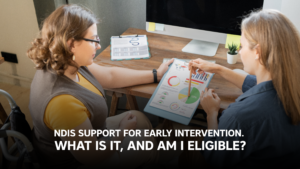
ndis business profitability strategies and factors
Becoming an NDIS provider Registration is a great investment and a business opportunity that offers a lot and while navigating NDIS business registration and NDIS

Embarking on the journey to become a registered NDIS provider is an important step towards delivering high-quality support services to individuals with disabilities. However, understanding the costs associated with this process is crucial for effective planning and budgeting. Here’s a breakdown of the costs you can expect during the NDIS provider registration process.
The initial cost you’ll encounter is the application fee. This fee varies depending on the type and size of your organisation, as well as the complexity of the services you intend to provide. Smaller providers or those offering basic services might pay less, while larger organisations or those providing a wide range of specialised services could face higher fees.
To ensure compliance with NDIS standards, all providers must undergo rigorous assessments and audits. These audits are conducted by approved quality auditors and can be a significant expense. The cost will depend on several factors, including the size of your organisation, the number of sites, and the range of services offered. It’s important to budget for these costs as they are a mandatory part of the registration process.
Registration is not a one-time expense. Maintaining your status as a registered NDIS provider requires ongoing compliance with NDIS Quality and Safeguards Commission standards. This includes periodic audits, continuous improvement activities, and staff training. Regularly setting aside funds for these ongoing costs is essential to ensure sustained compliance and service quality.
Investing in staff training and development is crucial for meeting NDIS standards. Training programmes, certification courses, and professional development workshops can incur costs, but they are necessary to equip your team with the skills and knowledge needed to provide high-quality services. Consider these expenses an investment in your team’s competence and your organisation’s reputation.
The registration process involves a significant amount of administrative work, including preparing documentation, developing policies and procedures, and setting up systems to monitor compliance. These tasks may require additional staff or consultancy services, adding to your operational costs. Efficient planning and resource allocation can help manage these expenses effectively.
As an NDIS provider, you are required to have appropriate insurance cover, including public liability and professional indemnity insurance. The cost of these policies can vary based on the size and nature of your services. Additionally, you may need legal advice to navigate the complexities of NDIS regulations and ensure your policies and contracts are compliant.
Implementing technology solutions to manage client data, track service delivery, and ensure compliance can be a significant cost. Investing in reliable software and infrastructure is essential for efficient operations and meeting NDIS requirements. Budgeting for these technological investments will help streamline your processes and enhance service quality.
To manage these costs effectively, it’s crucial to engage in thorough financial planning and budgeting. Here are a few tips:
While the costs associated with NDIS provider registration can be substantial, they are a necessary investment in delivering high-quality, compliant services. By understanding and planning for these expenses, you can navigate the registration process more smoothly and set your organisation up for long-term success. Remember, the benefits of becoming a registered NDIS provider, such as increased credibility, access to a larger client base, and enhanced service quality, far outweigh the initial costs.
Becoming a registered NDIS provider is an exciting opportunity to deliver vital services to individuals with disabilities. However, understanding the costs associated with NDIS provider registration is crucial for planning and budgeting effectively. From audits to insurance and training, the expenses can vary depending on your organisation’s size, services, and requirements.
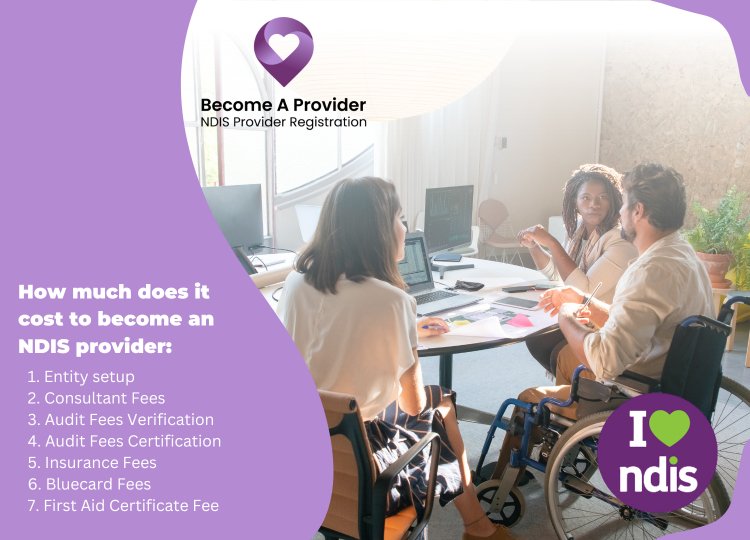
The NDIS registration cost includes several components, from setting up your business entity to ensuring compliance with NDIS Practice Standards. Here’s an overview of the key expenses:
The first step to becoming an NDIS provider is establishing a legal entity, such as a company or sole trader. This entity serves as the foundation for your NDIS registration.
Hiring an NDIS consultant can streamline the registration process. Consultants assist with:
While optional, consultants provide valuable expertise that reduces the likelihood of costly errors or delays.
The type of audit required depends on the services you provide:
Verification Audit ($900 – $1,800)
Providers offering lower-risk services, such as assistance with household tasks or mobility equipment, undergo a verification audit. This involves a desktop review of documentation, including:
Certification Audit ($2,800 – $5,000)
Providers delivering higher-risk services, such as high-intensity personal activities or behaviour support, require a certification audit. This comprehensive process includes:
Certification audits are more extensive and therefore more expensive than verification audits.
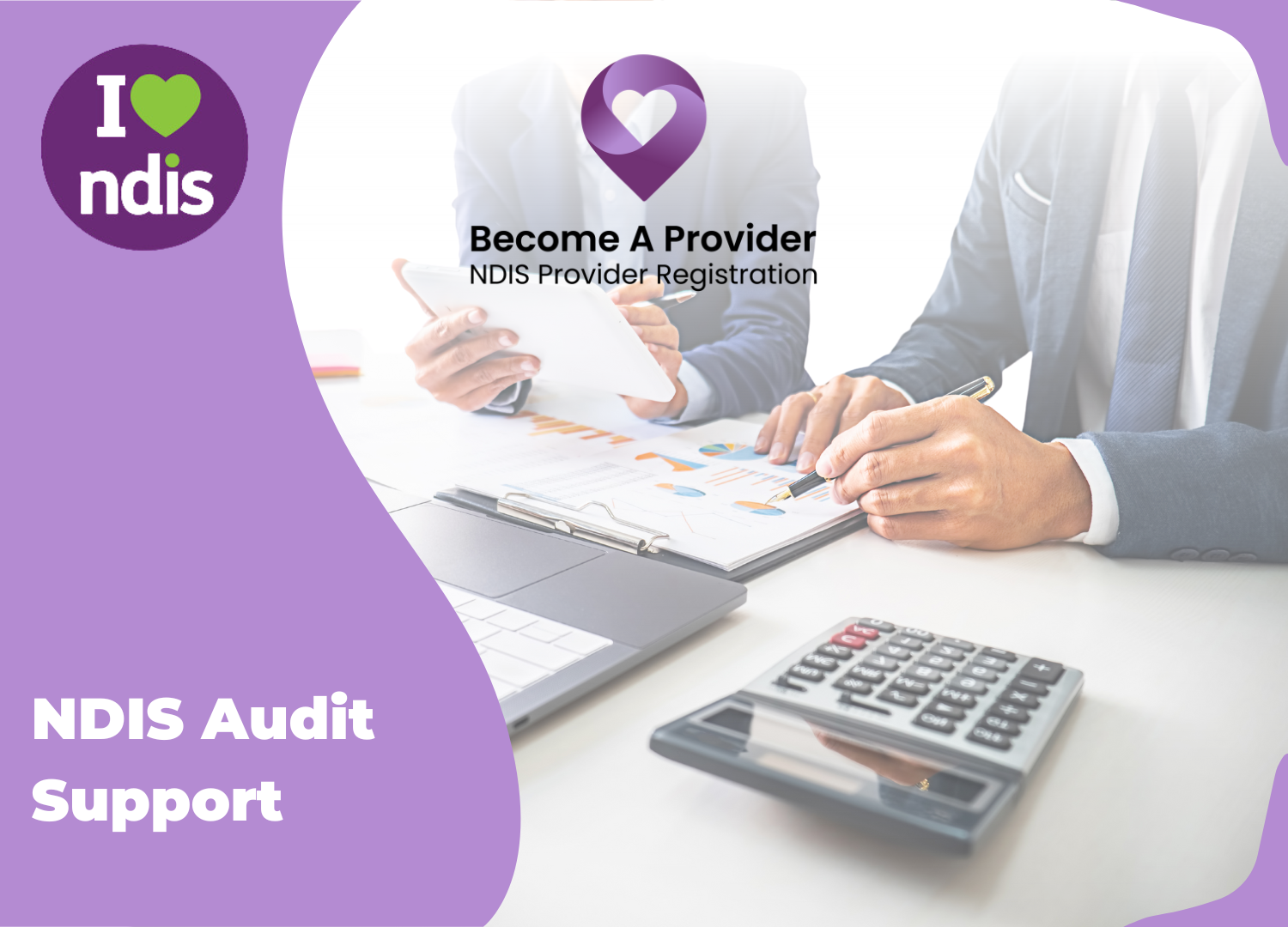
Providers delivering higher-risk services, such as high-intensity personal activities or behaviour support, require a certification audit. This comprehensive process includes:
Certification audits are more extensive and therefore more expensive than verification audits.
All NDIS providers must have adequate insurance, including:
Auditors may request proof of insurance as part of the NDIS registration process.
If your organisation provides services to children, obtaining a Blue Card (or equivalent) is mandatory. This cost typically applies per individual who requires clearance.
Depending on the services you offer, staff may need first aid certification. Costs vary by training provider and location.
By addressing these elements, you can streamline your registration process and avoid unnecessary complications.
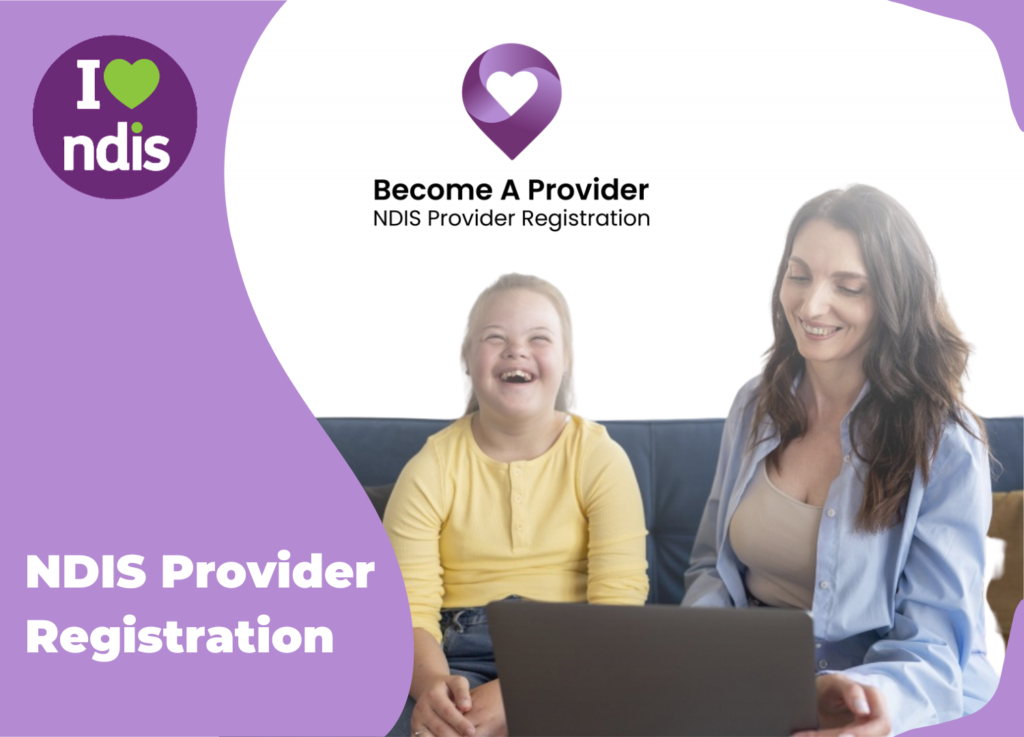
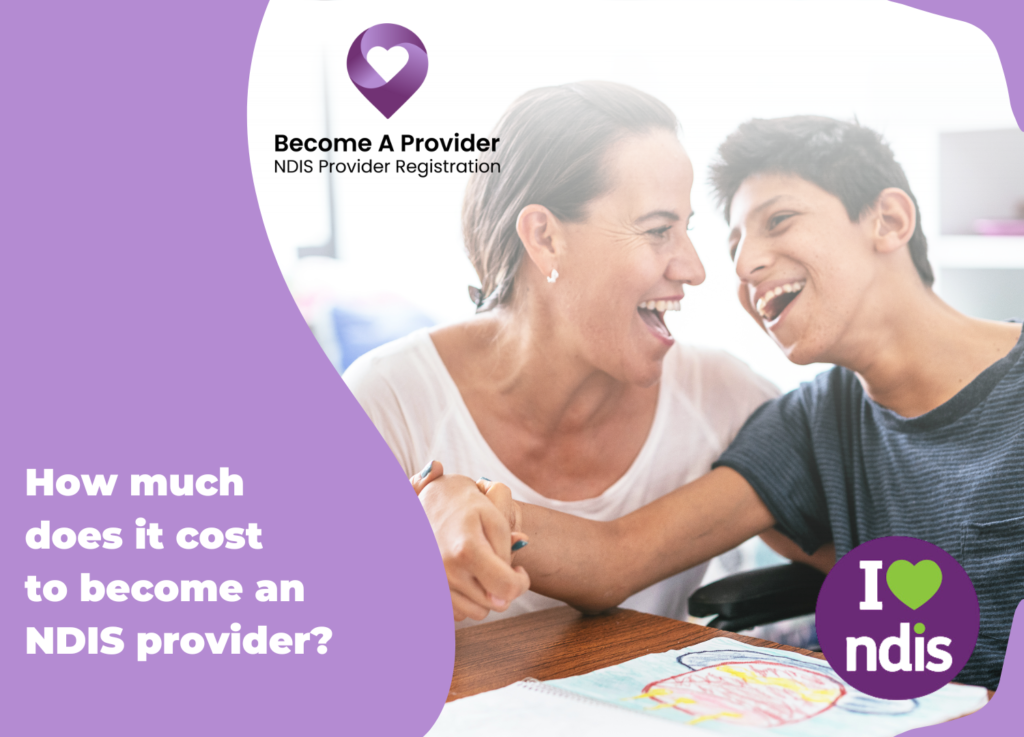
Understanding how much it costs to become an NDIS provider is essential for planning your registration journey. From entity setup and audit fees to insurance requirements, each cost contributes to ensuring compliance with the NDIS provider registration checklist.
If you’re ready to begin your registration process or need guidance on managing your NDIS registration cost , we’re here to help. Contact us today to learn more about how we can assist you in achieving successful NDIS provider registration.

Becoming an NDIS provider Registration is a great investment and a business opportunity that offers a lot and while navigating NDIS business registration and NDIS

The NDIS Scheme helps a large group of people with disabilities in Australia by providing support and services to enhance their lives. And to become

How to create a positive NDIS participant Whether you’re Working as an NDIS provider or wanting to become an NDIS provider, Ensuring a great experience

Becoming a National Disability Insurance Scheme become an NDIS provider provider can be a great business opportunity, but it also comes with a lot of

Helping participants navigate their plans effectively is an essential part of providing service and ensuring quality in your provider business. NDIS plan management is fundamentally

NDIS Resources Navigating the National Disability Insurance Scheme (NDIS) can often feel challenging and overwhelming. With updates on policy changes, new guidelines, and various support
These costs ensure compliance with the NDIS provider registration checklist and prepare your organisation to meet the standards required by the NDIS Commission.
No, there is no fee for submitting your NDIS provider registration application. However, costs arise from other requirements, such as audits, insurance, and staff clearances, which are essential for a successful application.
The cost of an NDIS audit depends on the type of audit:
Verification Audit: $900 – $1,800 for lower-risk services.
Certification Audit: $2,800 – $5,000 for higher-risk services, as these involve more comprehensive assessments.
Hiring an NDIS consultant is not mandatory, but it can be beneficial. Consultants provide expert guidance on compliance, completing the NDIS provider registration checklist, and preparing for audits. Fees range from $2,500 to $5,000.
You will need:
Public liability insurance
Professional indemnity insurance
Workers’ compensation insurance (if you have employees)
Insurance costs range from $20 to $80 per month, depending on your coverage.
A Blue Card (or equivalent working with children check) is required for organisations delivering services to children. The fee is typically $100 per person, but it varies by state or territory.
Yes, ongoing costs include:
Annual audit fees.
Monthly insurance premiums.
Staff training and certification updates.
Compliance monitoring and policy updates.
Yes, you can:
Plan ahead to avoid rushed expenses.
Leverage free resources from the NDIS website.
Bundle consultancy and audit services.
Keep policies and documentation updated to avoid re-audits.
If you fail an audit, the NDIS Commission will provide feedback on areas of non-compliance. You can address these issues and undergo a re-audit, which may involve additional costs. Hiring an NDIS consultant can help you avoid this situation.
The registration process can take several months, depending on the complexity of your application, the type of audit required, and how prepared you are with the necessary documentation.
You can consult with professional NDIS consultants who specialise in guiding businesses through the registration process. They can help you budget effectively and avoid unnecessary expenses.